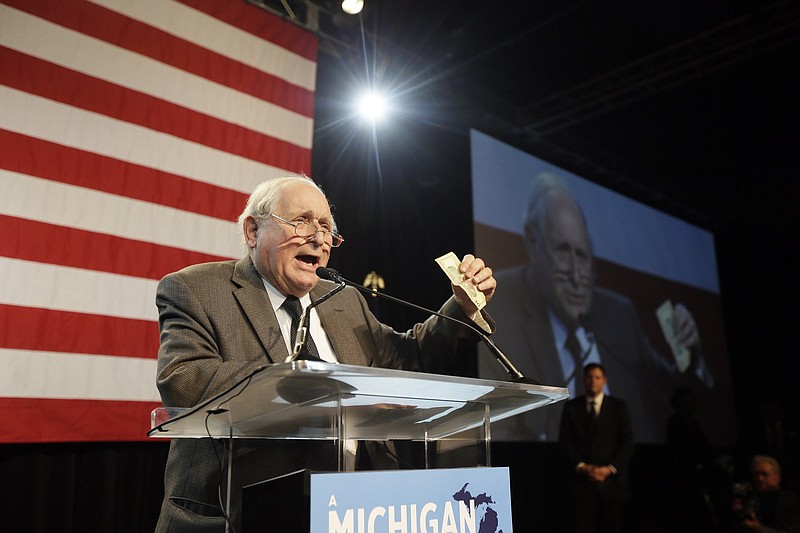DETROIT -- Former U.S. Sen. Carl Levin, a powerful voice on military issues in Washington and a staunch supporter of the auto industry back home in Michigan during his record tenure in the Senate, has died. He was 87.
The Harvard-educated civil-rights attorney and former taxi driver, who for decades carried his faded 1953 auto union membership card in his wallet, died Thursday, his family and the Levin Center at Wayne State University's law school said in a statement.
Levin represented Michigan longer than any other senator -- from 1979 to 2015 -- targeting tax shelters, supporting manufacturing jobs and pushing for military funding. His tenure was a testament to voters' approval of the slightly rumpled, down-to-earth Detroit native whom Time magazine ranked among the nation's 10 best senators in 2006.
"He's just a very decent person," Sen. Jack Reed, D-R.I., a fellow Senate Armed Services Committee member, said in 2008. "He's unpretentious, unassuming. He never forgets that what we're doing is enmeshed with the lives of the people he represents."
A Washington insider and former prosecutor known for his professorial bearing, Levin took a civil but straightforward approach that allowed him to work effectively with Republicans and fellow Democrats. He was especially astute on defense matters thanks to his years as the top Democrat on the Armed Services Committee.
And he didn't fear speaking his mind.
He was in the minority -- even among his Democratic colleagues -- when he voted against sending U.S. troops to Iraq in 2002, and two years later he said President George W. Bush's administration had "written the book on how to mismanage a war." He gave a cautious endorsement to President Barack Obama's 2009 buildup of troops in Afghanistan, but later warned of "the beginnings of fraying" of Democratic support.
He was also critical of President Ronald Reagan's buildup of nuclear weapons, saying it came at the expense of conventional weapons needed to maintain military readiness.
But, colleagues said, he almost always engendered a feeling of respect.
"We've always had a very trusting and respectful relationship," once said the late Sen. John Warner, R-Va., who for years worked closely with Levin on the Armed Services Committee. "We do not try to pull surprises on each other. The security of the nation and the welfare of the armed services come first."
Famous for wearing his eyeglasses down on his nose, Levin seemed to be the same candid, hardworking guy wherever he went, whether he was in front of cameras on Capitol Hill, on an overseas fact-finding mission or lost in the crowd of a college football stadium on game day.
"No one would accuse Carl Levin of looking like Hollywood's version of a U.S. Senator. He's pudgy, balding and occasionally rumpled, and he constantly wears his glasses at the very tip of his nose," Time magazine said. "Still, the Michigan Democrat has gained respect from both parties for his attention to detail and deep knowledge of policy, especially in his role as a vigilant monitor of businesses and federal agencies."
A foe of fraud and waste, Levin led an investigation in 2002 into Enron Corp., which had declared bankruptcy the previous year amid financial scandals. The probe contributed to a federal law that requires executives to sign off on financial statements so they could be criminally liable for posting phony numbers.
Levin pushed legislation designed to crack down on offshore tax havens, which he said cost the U.S. government at least $100 billion a year in lost taxes. He also was an advocate for stem-cell research and gun control.
Closer to home, Levin promoted policies benefiting the auto industry and supported giving $25 billion in loan guarantees to General Motors and Chrysler. He argued that a vibrant domestic auto industry was crucial to rebuilding the economy after the recession of 2008-09. He also was a member of a task force supporting efforts to fight pollution and other environmental problems affecting the Great Lakes.
"If you've ever worn the uniform, worked a shift on an assembly line, or sacrificed to make ends meet, then you've had a voice and a vote in Sen. Carl Levin," Obama said in 2013. "No one has worked harder to bring manufacturing jobs back to our shores, close unfair tax loopholes and ensure that everyone plays by the same set of rules."
